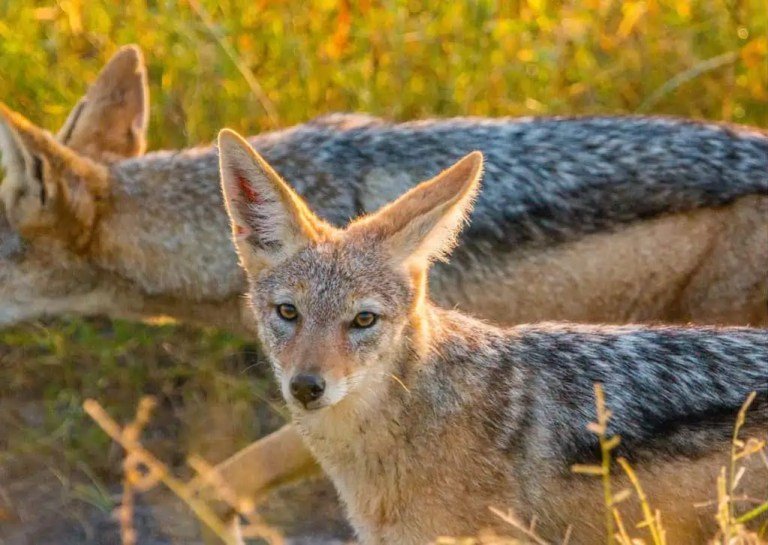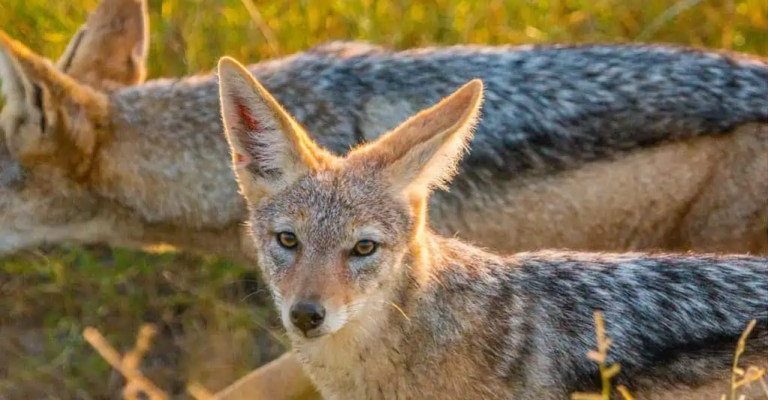
Imagine you’re sipping coffee with a friend who’s curious about wildlife. You’d probably share some cool facts about how jackals communicate, hunt, and adapt to their environment. After all, these animals aren’t just surviving; they’re thriving in various habitats, from deserts to grasslands. So, let’s dive into the world of jackals and explore just how smart these creatures really are!
Understanding Jackal Intelligence
Jackals, like many canids, showcase a range of cognitive skills that facilitate their survival. They are known for their problem-solving abilities and social intelligence. Whether it’s figuring out how to outsmart competition for food or coordinating with pack members during a hunt, jackals demonstrate complexity in their thinking.
One interesting aspect of jackal intelligence is their social structure. They often live in pairs or small family groups. This social setup isn’t just for companionship; it helps them work together in hunting or protecting territory. They use vocalizations—a mix of howls, barks, and yips—to communicate effectively. This sophisticated communication system hints at a level of cognitive awareness that goes beyond basic instinct.
Another remarkable trait is their adaptability. Jackals can thrive in various environments, from urban areas to remote wilderness. This adaptability speaks volumes about their intelligence. They can modify their diet and behavior based on the availability of resources, showcasing a flexible mindset that many animals lack.
Hunting Strategies and Problem Solving
When it comes to hunting, jackals are strategic. Unlike some predators that rely solely on brute strength, jackals often use a combination of stealth and cunning to secure their meals. They primarily hunt small mammals, birds, and carrion, but their hunting tactics vary depending on the situation.
For instance, jackals have been observed using different techniques based on the season and food availability. During certain times of the year, they might hunt alone, relying on their speed and agility to track down prey. In other situations, they team up, often working in pairs to outmaneuver larger prey or defend their catches from scavengers.
You might be wondering how they learn these strategies. Observation and experience play a crucial role. Young jackals watch their parents and pack members closely, picking up valuable skills and techniques. This hands-on learning contributes to their intelligence and ability to adapt to different challenges.
Social Behavior and Communication
Jackals are known for their engaging social behaviors, which hint at their impressive cognitive abilities. Their communication is key to their social structure, and it plays a vital role in hunting and territory maintenance.
These clever canines have a rich repertoire of vocalizations. From long, haunting howls that echo across the savanna to sharper barks used in close contact, their sounds serve different purposes. For instance, howling can help strengthen bonds between pack members and mark territory. It’s almost like a concert where each jackal knows when to join in!
In addition to sounds, jackals also communicate through body language. They’ll use specific postures, tail movements, and facial expressions to convey messages to one another. This level of non-verbal communication shows that jackals not only use their voices but also their bodies to express feelings and intentions.
Learning from Experience: Jackals and Their Environment
Jackals are not just clever; they’re also learners. Their ability to adapt and change their behavior based on experience is a true testament to their intelligence. For example, if a jackal finds a food source that’s regularly available, it will remember that location and may return to it repeatedly.
Additionally, jackals can learn from mistakes. If one of them gets too close to a danger—like a vehicle or another predator—they’ll likely remember that encounter and behave more cautiously in the future. This learning ability helps them navigate a world that can be both rewarding and perilous.
You might find it fascinating to know that jackals also engage in play, especially when young. This playful behavior is not just for fun; it serves as a way to develop social bonds and hone their skills for future hunting and survival. So, while they may seem like ordinary animals, they thrive in their environments by being smart and adaptable.
Jackals in Urban Settings
Interestingly, jackals have begun to adapt to urban environments in some regions, particularly in places like India. This shift has showcased their intelligence in a new light. Instead of retreating from human settlements, these animals have found ways to coexist and even thrive in urban areas.
In cities, jackals have learned to navigate traffic, scavenge for food, and avoid human interaction when necessary. Their ability to adapt to human environments is impressive, and it highlights their advanced problem-solving skills. It’s almost as if they’ve taken a page from the book of other urban-dwelling animals, like raccoons and foxes, using intelligence to exploit new opportunities.
This urban adaptation shows that jackals are not just surviving; they’re thriving. They adjust their behavior, learning quickly to find food sources like garbage and even preying on smaller pets. It’s a clear demonstration of how smart these animals are, as they continue to navigate the challenges presented by urban life.
The Importance of Jackals in Ecosystems
Beyond their intelligence, jackals play a significant role in their ecosystems. They help regulate populations of small mammals and scavengers, contributing to a balanced food web. By controlling these populations, jackals indirectly support the health of their environment.
Additionally, jackals also help in seed dispersal. As they move through their habitats, they consume fruits and other plant materials, later excreting the seeds. This process aids in plant reproduction, showcasing their ecological importance beyond just being clever hunters.
Preserving jackal populations is crucial for maintaining biodiversity. Their intelligence and adaptability make them key players in their habitats, and losing them could disrupt the balance that exists within the ecosystem. In this regard, understanding their behavior and cognitive abilities can help in conservation efforts.
In summary, jackals are far more than just clever animals darting across the savanna. Their impressive cognitive abilities, social structures, and adaptability to different environments showcase a level of intelligence that’s truly remarkable. From their strategic hunting tactics to their ability to thrive in urban settings, they demonstrate how versatile and smart these creatures can be.
As we continue to learn more about jackals and their place in our world, it’s essential to appreciate their role in maintaining healthy ecosystems. So, the next time you hear a jackal’s call echoing through the night, remember that there’s a whole lot more going on than meets the eye. These canines are not just surviving; they’re thriving, and it’s all thanks to their remarkable brains!

